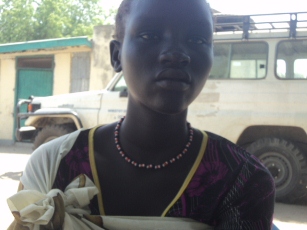Rescuing Jonglei’s abductees
March 3, 2012 (BOR) – Nurah Borotus spent 18 days walking to Waai and four days there before escaping to a police post and being reunited with her family on 7 February in Pibor.

Aguti Adut, the director of Community Security in Jonglei state, said the Murle women and children in the Lou Nuer counties of Akobo, Uror and Nyirol were identified by his officers with help of local leaders. Adut expects Pibor authorities to release kidnapped women and children from neighbouring tribes.
“We are going to Pibor [county] next week and if we get a child or a woman who is not a Murle, we shall bring them,” said Adut in Bor having brought three women and two children from Ayod and Akobo counties.
The abduction of women and children and cattle raiding between Lou Nuer and Murle tribes in Jonglei state intensified after years of civil war, which ended in 2005, left the state awash with small arms.
Armed Lou Nuer youths launched a revenge attack on Pibor county on Christmas Eve 2011. An estimated 6,000 Lou Nuer youths, ravaged Pibor villages saying they intended to rescue 180 children and women abducted in August 2011.
According to the account of Sirah John, a Murle woman who said she was abducted in January around Pibor town by Lou Nuer and taken to Ayod county with her child, she escaped and brought herself to the commissioner of Ayod who handed her to Community Security officers to be transported to Bor, the capital of Jonglei state, from where she proceed to Pibor to be reunited with her family.
Another woman, identifying herself as Kaka, said she was abducted in 2009 by Lou Nuer and taken to a village in Akobo county. Director of Community Security, Agut Adut, said he identified her during a surveying questionnaire.
“I saw her name on a paper and I said this woman seems not to be a Nuer,” Adut said of Kaka. “She was called and she narrated her story that she was abducted in 2009 [by Lou Nuer youth] and so we bring her here [to Bor] to take her to her relatives in Bor,” he added.
Kaka, Sira and a third unidentified woman with two children are the third group of abductees to recently escape or be rescued from Lou Nuer areas.
Another abductee, Nurah Borotus, said her child remained with an abductor. She escaped on 22 January from Uror county headquarters, Waai. A second girl came to Bor in February. A third group of three women and three children landed to Bor on a United Nations Mission in South Sudan (UNMISS) flight on 28 February.
“God bless the Government of South Sudan and Jonglei state,” Sirah said. “If there are children in Murle who belong to other tribe, I will ask for their release,” she added.
Nurah said her abductor had not been arrested and had attempted to remove her from the police station in Waai.
Nurah said she was abducted from Vertet payam [district] south of Pibor town and travelled for 18 days to Wau.
There is concern about the community security services; many of the abductees allegedly being held in Pibor are yet to be rescued and many of the abductors are yet to face criminal charges.
On 29 February Mading Alier, a Dinka Bor boy, escaped from abductees in Pibor and headed to Bor to be reunited with his parents. Alier was abducted on the Bor – Juba road in December when the car he was travelling in with his father was ambushed.
Jonglei state governor Kuol Manyang said the South Sudan army, the Sudan People’s Liberation Army (SPLA), which is mandated to conduct disarmament in the state, officially notified his office that the exercise was under way on 1 March.
“I briefed the [State] ministers, members of parliament, commissioners of the counties and paramount chiefs of the state [about disarmament] and they very much appreciate the [disarmament] move,” said Kuol.
With its limited road network, travel in Jonglei state is difficult, limiting the army’s disarmament programme to dry season months, which will end in April.
The president of South Sudan, Salva Kiir, in his February speech in Bor impressed upon the citizens his commitment to potentially forceful disarmament.
Previous disarmament programmes have become violent; in 2006 Lou Nuer were involved in clashes with the SPLA. This programme did not cover Pibor county which led the Luo Nuer to claim that they were forced to rearm themselves for defence against the Murle.
Several other assaults on Bor villages including Jalle’s attack on 5 December 2011 was blamed on members of the Murle ethnic group. An attack on Gurumuk payam in Pibor on 7 February was blamed on Dinka Bor putting greater pressure on the government to start disarmament.
(ST)
